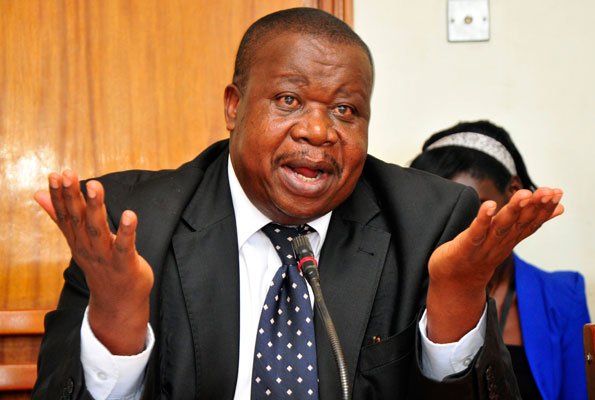
The Minister for Internal Affairs, RTD Gen Kahinda Otafiire, issued a stern warning to police chiefs to cease the physical abuse of opposition leaders, particularly targeting National Unity Platform President Hon Robert Kyagulanyi and former Forum for Democratic Change President. Kizza Besigye.
This directive, delivered on Tuesday during the handover ceremony of new police chiefs, underscores a significant shift in government stance amid escalating political tensions in Uganda.

The ceremony marked the official appointment of former Counter-Terrorism Chief Abas Byakagaba as the new Inspector General of Police (IGP), succeeding Martin Okoth Ochola. James Ochaya, previously the Director of Research and Planning, has been named Deputy IGP, replacing Maj. Gen. Tumusiime Katsigazi, who has returned to the Uganda People’s Defence Force (UPDF) for redeployment.Gen Otafiire's speech did not mince words. He admonished the police force for becoming perpetrators of the very laws they are meant to enforce.
"Do not beat opposition leaders Kyagulanyi and Besigye during their political demonstrations," he stated emphatically. "By doing so, you will be breaking the laws you are sworn to uphold."
Highlighting the legal recognition of political parties and their activities, Gen Otafiire stressed the importance of upholding constitutional rights.
"Demonstrations are provided for within the Constitution. Do not deny them their rights but guide them within the law," he instructed.
His message was clear: police should focus on maintaining order without resorting to violence.Gen Otafiire elaborated on how the police should manage political demonstrations.

He suggested that instead of obstructing opposition activities, the police should facilitate them in a controlled manner.
"If Kyagulanyi wants to go to Jinja, don’t stop him but escort him to where he is supposed to be. Don’t allow them to go to our schools and markets; take them to playgrounds and let them conduct their activities, and afterwards, they will go home."
This call for restraint and lawful conduct comes amidst growing criticism of the government's handling of political opposition. By advocating for a more measured approach, Gen Otafiire aims to align the police's actions with legal standards and human rights.During the event, Gen David Muhoozi also addressed the new leadership, urging IGP Byakagaba to tackle corruption and bribery within the police force.
"The President trusts you to lead the force, so do not disappoint him. Make sure you wipe out corruption in the police," Gen Muhoozi emphasized.
The internal issues of corruption have long plagued the force, undermining public trust and operational effectiveness.

Outgoing Deputy IGP Maj. Gen. Katsigazi acknowledged the numerous challenges facing the police, including inadequate budgets and insufficient manpower.
"Police operate on an inadequate budget, which has hindered many operations. On top of that, there is a lack of human resources," he noted.
He also pointed out that recruitment efforts are currently aimed at replacing officers who have deserted due to poor living conditions rather than expanding the force.
Additionally, he mentioned that the police's fleet of old vehicles is inadequate for efficient operations.Gen Otafiire also emphasized the urgent need to improve police accommodation, instructing SCP Sewanyana to collaborate with the Permanent Secretary of Internal Affairs to expedite the completion of police housing projects.
"I want the project finished as soon as yesterday," he demanded, highlighting the dire living conditions that many officers face.
The handover ceremony, attended by top officials and stakeholders, underscores a critical moment for the Ugandan police force. With new leadership at the helm, the emphasis is now on reform, adherence to the law, and the eradication of internal corruption.

The directives issued by Gen Otafiire and other officials aim to create a police force that upholds justice and respects the rights of all citizens, including political opposition leaders.
.jpg)
This shift, if effectively implemented, could mark a significant step towards restoring public confidence in law enforcement and ensuring a more stable and democratic Uganda.











